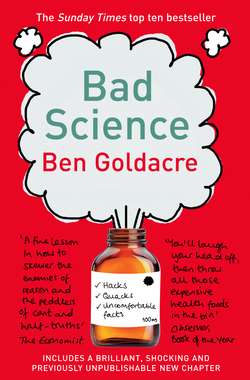Читать книгу Bad Science - Ben Goldacre - Страница 22
5 The Placebo Effect
ОглавлениеFor all the dangers of CAM, to me the greatest disappointment is the way it distorts our understanding of our bodies. Just as the Big Bang theory is far more interesting than the creation story in Genesis, so the story that science can tell us about the natural world is far more interesting than any fable about magic pills concocted by an alternative therapist. To redress that balance, I’m offering you a whirlwind tour of one of the most bizarre and enlightening areas of medical research: the relationship between our bodies and our minds, the role of meaning in healing, and in particular the ‘placebo effect’.
Much like quackery, placebos became unfashionable in medicine once the biomedical model started to produce tangible results. An editorial in 1890 sounded its death knell, describing the case of a doctor who had injected his patient with water instead of morphine: she recovered perfectly well, but then discovered the deception, disputed the bill in court, and won. The editorial was a lament, because doctors have known that reassurance and a good bedside manner can be very effective for as long as medicine has existed. ‘Shall [the placebo] never again have an opportunity of exerting its wonderful psychological effects as faithfully as one of its more toxic conveners?’ asked the Medical Press at the time.
Luckily, its use survived. Throughout history, the placebo effect has been particularly well documented in the field of pain, and some of the stories are striking. Henry Beecher, an American anaesthetist, wrote about operating on a soldier with horrific injuries in a World War II field hospital, using salt water because the morphine was all gone, and to his astonishment the patient was fine. Peter Parker, an American missionary, described performing surgery without anaesthesia on a Chinese patient in the mid-nineteenth century: after the operation, she ‘jumped upon the floor’, bowed, and walked out of the room as if nothing had happened.
Theodor Kocher performed 1,600 thyroidectomies without anaesthesia in Berne in the 1890s, and I take my hat off to a man who can do complicated neck operations on conscious patients. Mitchel in the early twentieth century was performing full amputations and mastectomies, entirely without anaesthesia; and surgeons from before the invention of anaesthesia often described how some patients could tolerate knife cutting through muscle, and saw cutting through bone, perfectly awake, and without even clenching their teeth. You might be tougher than you think.
This is an interesting context in which to remember two televised stunts from 2006. The first was a rather melodramatic operation ‘under hypnosis’ on Channel 4: ‘We just want to start the debate on this important medical issue,’ explained the production company Zigzag, known for making shows like Mile High Club and Streak Party. The operation, a trivial hernia repair, was performed with medical drugs but at a reduced dose, and treated as if it was a medical miracle.
The second was in Alternative Medicine: The Evidence, a rather gushing show on BBC2 presented by Kathy Sykes (‘Professor of the Public Understanding of Science’). This series was the subject of a successful complaint at the highest level, on account of it misleading the audience. Viewers believed they had seen a patient having chest surgery with only acupuncture as anaesthesia: in fact this was not the case, and once again the patient had received an array of conventional medications to allow the operation to be performed.*
When you consider these misleading episodes alongside the reality—that operations have frequently been performed with no anaesthetics, no placebos, no alternative therapists, no hypnotists and no TV producers—these televised episodes suddenly feel rather less dramatic.
But these are just stories, and the plural of anecdote is not data. Everyone knows about the power of the mind—whether it’s stories of mothers enduring biblical pain to avoid dropping a boiling kettle on their baby, or people lifting cars off their girlfriend like the Incredible Hulk—but devising an experiment that teases the psychological and cultural benefits of a treatment away from the biomedical effects is trickier than you might think. After all, what do you compare a placebo against? Another placebo? Or no treatment at all?
